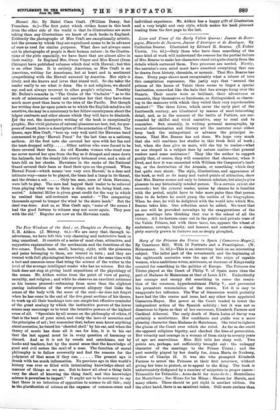The Five Windows of the Soul ; or, Thoughts on
Perceiving. By E. H. Aitken. (J. Murray. 6s.)—We are sorry that, through in- advertence, we have left this very charming and instructive book so long unnoticed. It consists of a series of most clear, attractive, and suggestive explanations of the mechanism and the functions of the five senses. Touch, taste, smell, hearing, sight, with the pleasures and pains belonging to them, are treated in turn ; and they are treated with full physiological knowledge, and at the same time with a tact and common-sense that bring the science of the writer to the level of the'average intelligent reader who has no science. But the book does not stop at giving lucid expositions of the physiology of the senses. Mr. Aitken writes from the point of view of poetry, morality, and religion ; and while he observes an excellent reticence as his lessons proceed—refraining from more than the slightest passing indications of the ever-present allegory that links the senses of the body with the sense of the soul—he does not forget when he has come to the end of the five great sections of his theme, to work up all their teachings into one simple but effective reminder of the great analogy by which the instinctive powers of the lower senses may encourage us to trust the intuitive powers of the highest sense of all. "Speculate by all means on the philosophy of ethics, if that is the bent of your mind, and study the laws of acoustics and the principles of art ; but remember that, before man knew anything about acoustics, he tuned his °horded shell' by his ear, and when the theory of music has done all it can for him, it is to his ear that the last appeal must lie in every question of harmony or discord. And so it is not by creeds and catechisms, not by books and teachers, but by the moral sense that the knowledge of good and evil enters the soul! of a man. The function of moral philosophy is to follow reverently and find the reasons for the judgment of that sense if they can. The present age is drunk with too much information. No previous age in this world's history was ever so filled with intoxicating knowledge about all manner of things as we are. But to know all about a thing falls very far short of knowing the thing itself, and this knowledge science is powerless to impart." It ought not to be necessary to say that there is no intention of opposition to science in all this ; only to the glorification of science at the expense of common-sense and
individual experience. Mr. Aitken has a happy gift of illustration and a very bright and easy style, which makes his book pleasant reading from the first page to the last.


















































 Previous page
Previous page